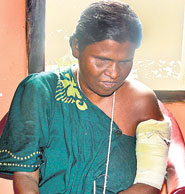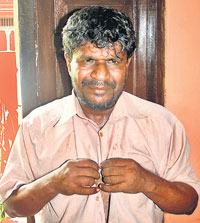
No hope in sight for sightless coupleThe visually-impaired couple who sustained injuries and whose daughter was killed in the February 3 Fort Railway Station suicide attack, are still awaiting compensation even three months after the incident While bomb blasts in the south of the country continue to shatter the peace and destroy lives and property, bomb victims are struggling to get the compensation they say they are entitled to. Even months after a blast, victim families wait in expectation of financial relief. One such family is that of P. H. Chandradasa, of Seeduwa. Mr Chandradasa and his wife, who are both visually impaired, and their 12-year-old daughter Sandhya were present at the Fort Railway station when a suicide bomb attack took place on February 3. The child was killed in the blast and the couple sustained injuries. Yesterday, three months after the tragedy, the family remembered Sandhya with an almsgiving they could hardly afford. They are still awaiting full compensation, which has been delayed for various reasons. The family has so far received Rs. 25,000, but Sandhya’s eldest sister, Chathurika Dilrukshi, 22, said the family was entitled to more, according to promises made soon after the incident. “We were told that Sandhya’s funeral expenses would be covered, and that because both my parents were affected by the blast they were entitled to compensation. But we haven’t received this money yet,” she said.
Chathurika said her parents were promised Rs. 50,000 in compensation, but she had since heard that they would get only a percentage of that money. Payments would be based on recommendations made by the doctor who examined each injured person; a full payment was not guaranteed. Chathurika said a government official had visited their home with documents relating to Sandhya. The forms were duly filled and signed and the officer had promised to work on the case and ensure compensation would be deposited in the family’s bank account. Meanwhile, Mr. Chandradasa’s own documentation was completed when he went to hospital for a check-up, but his wife’s documents remained incomplete. As a result, she is unable to claim her compensation. “My sister and my brother tried to get my mother’s forms filled when they took her to hospital to have her dressings changed, but so far we have not been successful,” Chathurika said. She said the family has experienced obstacles in trying to access authorities in order to complete their mother’s medical documentation. “Getting into the hospital itself is an effort,” she said, adding that no one had made any effort so far to provide directions on whom to approach. “I made a special visit to Ward 63, where my mother was admitted after the blast. A nurse told me I would have to pay for the treatment, and that the ward was not in a position to do anything about the documents. And she did not tell me where to go to get the job done. We have all the data necessary, all we need is some medical personnel to help us complete the forms. But it is taking a very long time.” The blind Mrs. Chandradasa is currently undergoing Ayurvedic treatment for her injuries. She still has shrapnel from the bomb blast embedded in her body, and she suffers partial deafness in one ear. Trips to Colombo for treatment, mostly in three-wheelers, are proving a heavy financial burden on the family. According to Chathurika, her mother has yet to consult a doctor about her hearing problem after her discharge from hospital. Dinendra, another sister, said family members do not have an opportunity to approach a doctor when they take their mother on her routine visits to the hospital. “They call her in, do the X-rays, change her dressings and discharge her and we don’t get to talk to anyone.” Meanwhile, Mr. Chandradasa, who used to make a living as a street vendor selling bed linen, towels and sarongs, is unable to resume his former trade. As a result, the family has to depend on financial help from friends, neighbours and well-wishers. “I feel excruciating pain when I move the fingers of my right hand. The doctors said they are unable to help and have asked me to see a neurologist,” he said. In April, Mr. Chandradasa tried to get back to his street vendor business. For three days he plied his route between Gampaha and Kirindiwela but was forced to give up because of the severe pain in his hand. “So we have no income at present,” he said. Mr. Chandradasa is sad that his disability has also affected the little social life that he and his family once enjoyed. “I would attend little village functions and supply the music. I am a fairly accomplished musician and can play both violin and flute. Sandhya would accompany me. She was good at tuning the violin and fixing broken strings.” The pain in his hand means that Mr. Chandradasa has had to give up his music playing as well. Chathurika said: “I wanted to do a job, but that is now impossible, because I have to be with my parents. But meanwhile, despite the difficulties at home, I have started studying for an external degree and go for classes every Saturday. My sister Dinendra and my brother Nilanka have done their O/L examination, but they have stopped their schooling.” Ministry cannot help when it comes to hospital red tape The Ministry of Resettlement and Disaster Relief Services last year handed out Rs. 12.7 million in compensation to victims of six separate incidents of terrorism, and so far this year Rs. 17.2 million to victims of nine such incidents, according to ministry secretary, A. C. M. Rasik. “There’s no delay in making compensation, and the Ministry has sufficient funds. But we cannot give compensation until the victim or the victim’s next of kin has produced the necessary documentation,” Mr. Rasik said, adding that the Ministry was not in a position to expedite matters because the victims or their families were expected to furnish documentation stamped and signed by the relevant hospitals and medical authorities. Mr. Rasik said the number of cases awaiting compensation could not be verified for the moment. Official figures showed that some 500 new applications for compensation from victims or their families had been forwarded for processing. “It takes seven to eight months to get the documents ready to apply for compensation”, said a government official, pointing out that any delay in issuing compensation was a result of a delay in completing the relevant documents. Compensation of Rs. 10,000 was given to 51 persons who were injured in the recent Piliyandala bus bomb blast, some of whom were still in hospital, and the families of the fatally injured were given compensation according to various victim categories: compensation for dead persons who were married was Rs. 50,000; for unmarried victims Rs. 35,000, and Rs 25,000 for minors. The maximum amount due to married victims was Rs. 100,000, and Rs. 25,000 for minors. A further Rs. 10,000 was given to cover funeral expenses for all three categories of fatal casualties. Two months ago The Sunday Times reported that the government would need more than Rs. 210 million to cover compensation costs for victims of bomb blasts and other war-linked incidents, while noting the Ministry had only Rs. 45 million available for the purpose.Of the required Rs. 210 million, according to the report, a sum of Rs. 157.2 million would be for 2,792 cases of death and Rs. 53.7 million for 1,582 cases of injury. |
|
||||||
|| Front
Page | News | Editorial | Columns | Sports | Plus | Financial
Times | International | Mirror | TV
Times | Funday
Times || |
| |
Reproduction of articles permitted when used without any alterations to contents and a link to the source page.
|
© Copyright
2008 | Wijeya
Newspapers Ltd.Colombo. Sri Lanka. All Rights Reserved. |

